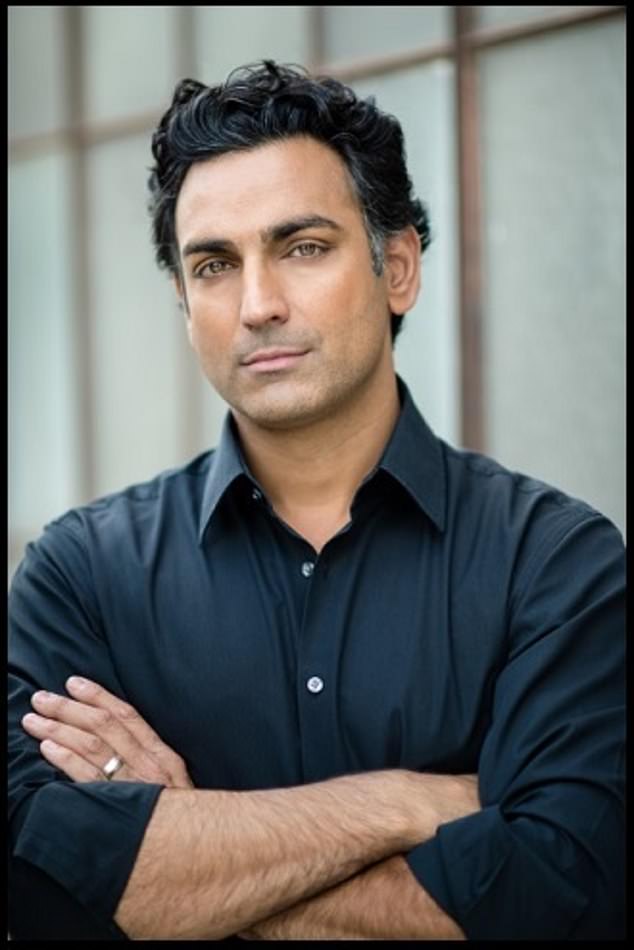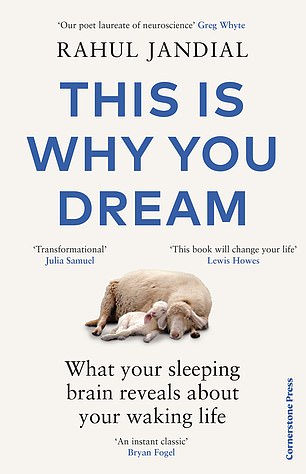I’m a Neurologist – Here’s What It REALLY Means When You Have a Sex Dream About Your Boss, a Friend’s Partner, or Someone You Don’t Find Attractive
Ever woke up from an erotic dream feeling completely freaked out?
About eight in ten people at some point dream of having sex with people they don’t even find attractive – often friends and colleagues.
In some cases it can cause an overwhelming feeling of guilt: for example, if the dream involved a friend’s partner, or if the dreamer cheated on his partner.
For others it can be very confusing; it is not uncommon for straight people to have erotic dreams about someone of the same sex.
Now a new book has attempted to explain why we dream about certain individuals and reassure people that sex dreams are not always the result of our subconscious desires.
Dreamers typically imagine someone they know, even if they are extremely plain or unattractive (stock image)
Neuroscientist Dr. Rahul Jandial says that there are generally two types of sex dreams, and their causes are completely different.
A sex dream involving someone you are attracted to and regularly fantasize about while awake can often manifest in our dreams.
But in the other type of sex dream, seemingly random people star, even if the dreamer hates them or finds them unattractive.
All dreams are the product of the imagination network in our brain, not bound by the rules and logic of our waking lives.
When we dream, the imagination is unfettered and free to find loose associations and connections in our memories.
It can cause us to think about the people in our lives in surprising, disturbing, and even erotic ways.
Because the Logical Executive Network in our brains shuts down during dreaming, we can’t stop these erotic flights of fancy before they start. They are also free from judgment – even ours.
In erotic dreams we are free to imagine sexual encounters that would be taboo or unthinkable in our waking lives.
They probably won’t involve our current partner. Instead, we have a much greater tendency towards bisexuality and new sexual interactions in general.
Dr. Jandial says: ‘This moderating influence on our erotic imagination when we are awake is gone when we dream, allowing our erotic dreams to be immensely creative and exploratory.’
That same moderating influence that becomes useless allows us to dream of flying at high altitudes or breathing underwater, or any number of creative scenarios.
Dr. Jandial adds, “If our daytime fantasies are visions of a desired, if unlikely, sexual outcome, erotic dreams are more like a lustful thought experiment.
“We can change gender or become bisexual in our dreams, even though it never occurs to us during the day or in our most liberated imagination.”

Neuroscientist Dr. Rahul Jandial argues that sex dreams are a benign product of an unbridled imagination and nothing to be ashamed of

The new book by Dr. Jandial explains why we dream about certain individuals and reassures people that erotic dreams are not always the result of unconscious sexual desires
And whether someone experiences a sex dream has little to do with how sexually active he/she is in waking life, how much porn he/she watches, or how much he/she masturbates.
The best predictor of sex dreams is how often a person daydreams or fantasizes about sex.
Dr. Jandial says: ‘If our erotic imagination is more active when we are awake, it is very possible that we are more open to erotic dreams at night.’
It may come as a surprise to know that the mind does not usually conjure up the ideal sexual partner to star in one’s erotic dreams; it rarely includes the ultimate dream partner. More often than not, the dreamer personally knows the star of his erotic dream.
Dreamers typically imagine someone closer to home, someone extremely ordinary, unattractive, or even repulsive.
This is why sex dreams often feature ex-partners, ex-boss, colleagues, friends, neighbors and even family members, and often take place in familiar surroundings.
Scientists propose that sex dreams have a basis in evolution, preparing early humans (and animals) to adapt to the unexpected, such as the sudden death of a partner.
As Dr. Jandial puts it: ‘This may help explain why erotic dreams tend not to look outside “the tribe”, but to stay close to home.’
The important role that familiarity plays in conceiving erotic dreams could also explain the number of times someone fantasizes about Halle Berry, Ryan Gosling, Jennifer Anniston, or any number of attractive celebrities.
Dr. Rodrigo Quian Quiroga of the University of Leicester in England has found that celebrities are deeply ingrained in our brains at the cellular level and become as familiar to us as our own grandmother.
Dr. Quiroga connected wire-thin electrodes placed in the cerebral cortex of people’s brains to see how individual neurons fire, and found that specific neurons responded to photos of celebrities.
In one patient, a single neuron responded to a photo of Halle Berry and ignored photos of other people. It responded to photos of her on the red carpet, in costume, even just her written name.
In another patient, Dr. Quiroga noticed a specific neuron firing in response to seeing pictures of Jennifer Anniston, and ignored pictures of other people, animals and buildings.
Dr. Jandial writes: Celebrities have literally taken root in our neural architecture. Our response to them shows that they are as familiar to us as an old friend or neighbor.’
The star of the erotic dream, whether it is an ex-lover or a supervisor at work, is less important than what the dream symbolizes.
For example, a conversation with the boss in a dream may be less about how attractive you find him or her, and more about wanting to exert more power at work or recognizing your own professional ambitions.
Dr. Jandial says, ‘In this way, erotic dreams are more than our true desires: they are the embodiment of desire itself.
“Erotic dreams prepare us for sexual exploration… This makes sense when we consider that the essential biological necessity of life is to survive at least long enough to reproduce.”
